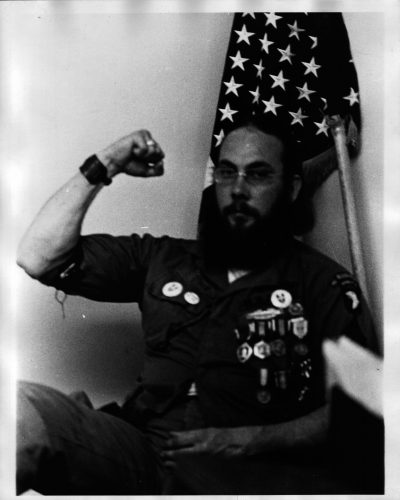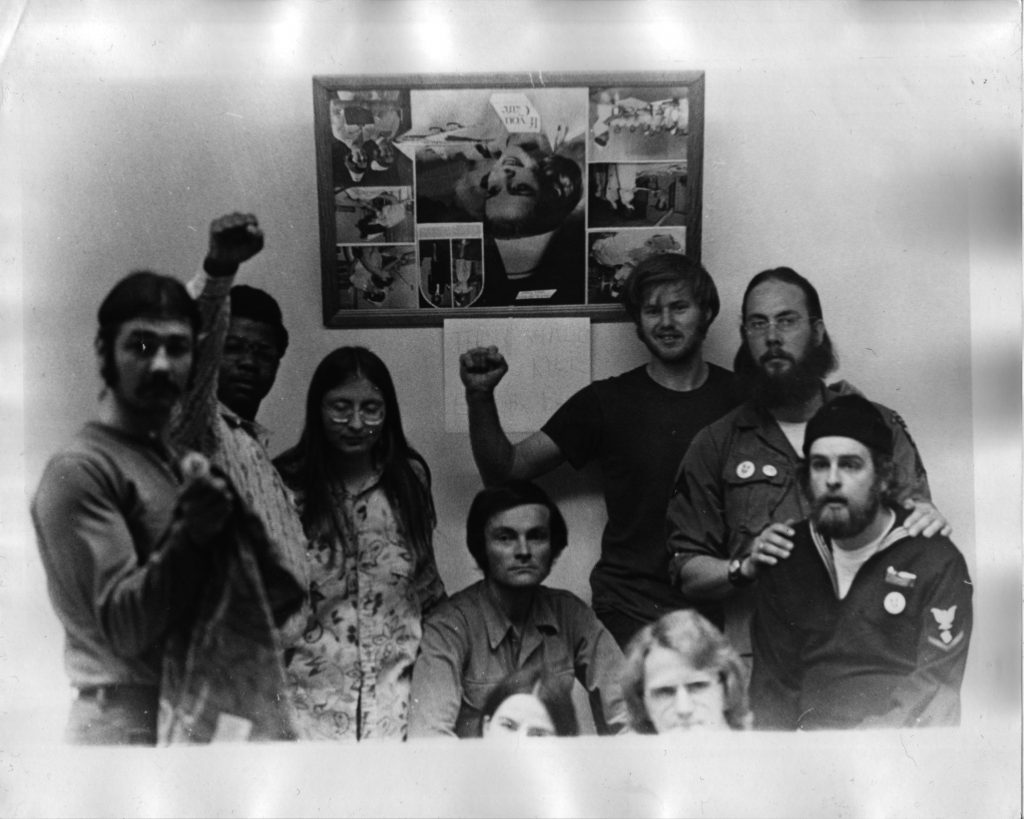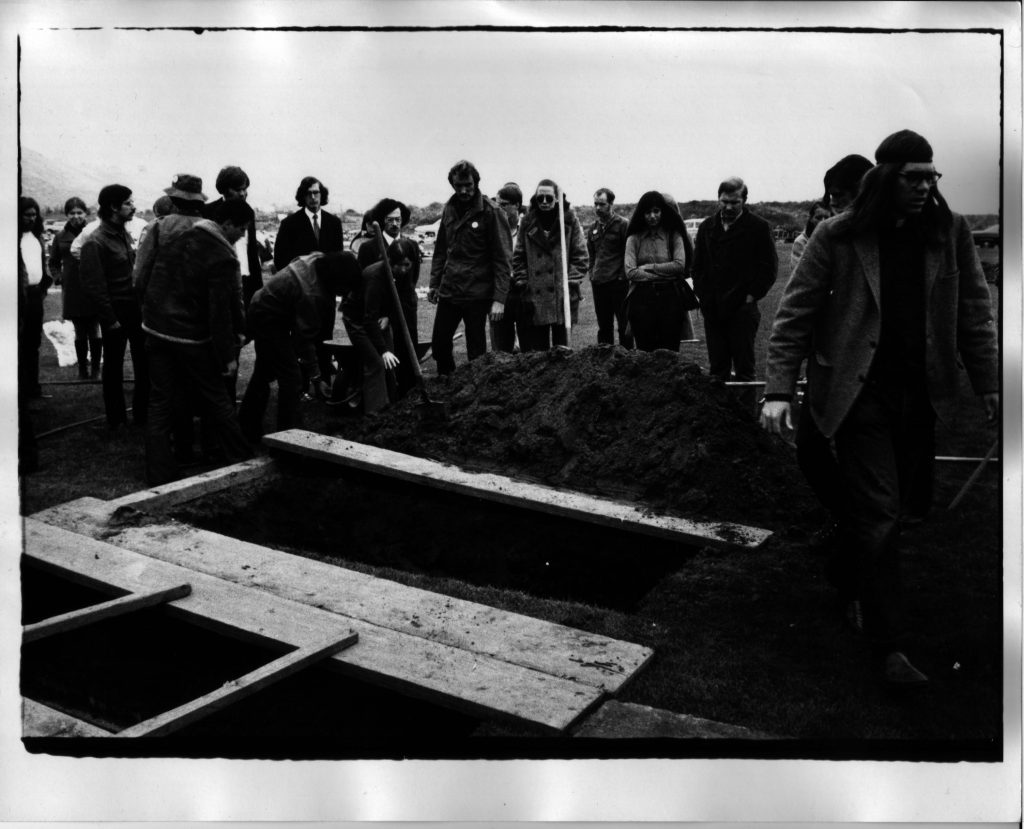A Veteran’s Death: “Vietnam left me so Alone. How Could I take the Life of a Human? Why was Killing Humans fun? Can God Forgive Me?”

Back in 1972, near the end of the Vietnam War, I was living in San Francisco, and my friend ex-Sgt. Van Dale Todd, a combat veteran of the 101st Airborne, lived next door in the same building, an old Victorian house out on 29th Street. Sometimes Van would take a notion to hit the wall which separated our apartments with his fist and shout, “Who the fuck would join the Marine Corps?”
I’d yell back, “Airborne sucks!”
“The Marine Corps sucks!” Van’d shout.
“Only two things come out of the sky,” I’d yell back again. “Bird shit and fools!”
That was how we said good morning to each other. It was our ritualized greeting.
We didn’t set out to live next door to each other; it just happened. One day I discovered that someone had moved into the adjacent apartment and had pasted a peace sign on his door. A day or two later I encountered him on the landing. He was a tall, powerful-looking guy, about 22 years old, with shoulder-length hair and wearing a combat fatigue jacket, similar to mine. He introduced himself as “Van.” In the course of the conversation we found that we were both ex-GIs and also, coincidentally, members of the same veterans’ anti-war organization.
Van glanced at my door. “You need a peace sign there,” he observed. He produced one from his pack and pasted it up. “There,” he said, nodding with the satisfaction of seeing a job properly done, “We’re going to be a peace family here in this building.”
During the weeks that followed, we saw each other almost every day. We attended antiwar rallies together and once even got arrested together. Van told me about his experiences in “Nam,” the killing he’d seen and participated in, the stress and the widespread drug use among GIs. “I got this medal for killing two people,” he told me, showing me his bronze star, “and when I did it I was high on opium.”
Although I’d spent four years in the USMC, I was never in Vietnam. I was both fascinated and also slightly horrified at Van’s stories. That was before I ever heard the term “post-traumatic stress disorder,” but it was clear that Van had brought some of that violence back with him.
One day he got in a fight with his cat. I heard a terrible racket in Van’s apartment and, on going over to see what it was all about, I found that Van was about to whip the kitty with his belt. “The cat’s shit was weak!” he told me angrily, meaning that the poor animal had done something to displease him.
I intervened, telling him that if he wasn’t going to be kind to his pet, I’d take the animal away from him. It was a plea rather than a threat. Van was a big man who could easily have broken me in half had he wished to, but he relented, took the animal gently in his arms and said, “I love my cat.”
Van did love his cat. One side of him was kind, gentle, loving and caring. But there was also that violent part, seething just below the surface.
On the corner was a small grocery run by a guy who seemed to go out of his way to be rude to his customers. One day I was in there to get a newspaper, and the owner gave me a bad time, so after that I avoided the shop. But Van sometimes went in there, apparently just to hassle with the guy. On one occasion that I heard of later, the shopkeeper threatened Van with a baseball bat. But Van didn’t back off. Instead, he told the guy, “You put that thing away or I’ll wrap it around your neck!” The guy put the bat away.
One day, while waiting for the J-Church streetcar, I happened to notice that a sheet of plywood had been placed over one of the store windows. At the time I didn’t think much of it, but a couple years latter a mutual friend told me that he and Van had been walking past the store late one night when Van found a brick laying on the sidewalk. So he picked it up and put it through the window of the nasty shop owner.
That was Van. There was a capricious side to him, sometimes innocently playful, sometimes dangerously violent. Nevertheless, he hated violence, having experienced so much of it in Vietnam. “I killed seven people in Vietnam,” he told me. “I killed a mother who was crying because her children were all dead.”
He told me these stories remorsefully, blaming himself for having enjoyed warfare. “I loved combat,” he told me many times, shaking his head. “I was so sick I loved to kill.”
Van had once believed in the Vietnam War, and he was a guy who’d fight for what he believed in. He’d enlisted in the Army, volunteered for the paratroopers, and asked to be assigned to Vietnam. He spent seventeen months in combat with the 101st Airborne in 1969 and 1970. After returning from Vietnam, however, he had a complete change of heart, and joined Vietnam Veterans Against the War and took part in peace marches.
Van didn’t want another GI sent to Nam because he knew that would be one more person coming back traumatized. “I don’t want my little brother Sam, or anybody’s little brother, to go and see what I saw or do what I did.” Perhaps the thing that horrified Van most was to discover that violence and killing could be enjoyable.
Nevertheless, Van was not really political, or maybe I should say he wasn’t much given to theories or analysis. When I tried to explain to him what U.S. corporations were doing around the world, and how the military was used to defend them, he would say, “What you have is an intellectual, philosophical view.”
“How can you say that?” I objected.
“You weren’t in Nam,” he would say, as he had said time and again. “You don’t know what it’s like to see your buddies die in front of you.”
It was clear that Van had experienced things that were truly, truly horrifying, and that’s the way it was. What could I say? My experiences had been quite different from Van’s. I’d spent four years in the peacetime USMC, and after that had traveled and lived in many countries of Europe and Asia, talking with people from those different places. One person who’d made a major impression on me was a Frenchman who’d fought in Algeria. Others were Japanese activists who opposed their country’s military alliance with the US. I’d talked with Israeli kibbutzniks as well as with Palestinians living in the West Bank. I’d listened to them and considered their viewpoints, just as I was now listening to Van, and from all that, I’d drawn my conclusions. Nevertheless, both of us, Van and I, each in his own way, had come to oppose the war in Vietnam, and were in the same antiwar veterans group.
Our Bay Area chapter had done several actions, and at this time we were planning another. On April 17, 1972, Van and I were part of a group of sixteen ex-GIs who occupied an Air Force recruiting office to protest the war. After three hours’ occupation, Federal Marshals broke the door down and arrested us. We spent the night in jail and were bailed out the next day.
On April 21, we went back to court for a preliminary appearance and got our first look at Judge Lloyd Burke. Judge Burke sat there, just leaning on his elbow and looking bored, like an old railroad engineer gazing at the scenery along the spur he’s been chugging up and down for the last twenty years. The charge was “disorderly conduct,” and, using the pretext that it was a “minor offense,” the judge refused us a trial by jury. When our attorney pointed out that trial by jury was a constitutional right, stated in the Sixth, Seventh and Fourteenth Amendments, Judge Burke just said, “Overruled,” without even lifting his chin off his elbow, and then he set our trial dates.
To Van, it was a heavy shock. About all he could say when we got home was, “The Man just doesn’t give a shit about us!” He was referring to Judge Burke.
“Did you expect him to?” I said, a bit surprised at Van’s remark.
At first he didn’t respond. “No, I guess not,” he said at last.
I was also disappointed, but, having fewer illusions about the nature of the system, I was less surprised. “Judge Burke’s a cog of the war machine,” I said. “He was obviously assigned to our case for the purpose of putting some quasi-legal façade on a very dubious process. The reason for denying us a jury trial is that he doesn’t want to take any chances on our getting acquitted.”
Our veterans group had done a similar action some four months earlier. On that occasion we’d occupied the offices of the South Vietnamese Consulate. That had resulted in a month-long jury trial which had ended in a verdict of ‘not guilty.’ So this time the powers that be apparently decided to sidestep the jury process. Perhaps Van understood my explanation, but he seemed unable to accept it. He sat there for a long time with a vacant look in his eyes.
Van probably did expect the judge to care about us. Van still believed very deeply in something he called “America.” In Van’s “America,” there was still something left of that romantic, mythical age when you could just walk into the White House and talk with the President and tell him the problem. Van saw public officials as people who listen — which sometimes they do on rare occasions, but not quite as often as Van seemed to think.
Five of our group, including Van and myself, went on trial a week later in the courtroom of a different judge, Judge Robert Schnacke. This judge didn’t lean on his elbow, but he did reaffirm the decision to deny us our constitutional right to trial by jury, then, at the end of a two-hour session, found us all guilty.
The irony was that trial by jury is one of the most fundamental American rights which Van had supposedly fought to defend. Although it has often been wrongfully denied, as it was in our case, the right to trial by jury is an ancient principle of English and American law which existed before the U.S. Constitution was written, and even before the Thirteen Colonies were founded. It goes back to the Magna Carta of 1215 A.D., and even before.
Before sentencing we were each allowed to say a few words. Van, wearing all his medals on his fatigue jacket, stood up and began: “I was a machine gunner . . .” He told of the horrors he’d seen and even committed himself, and of his buddies he’d seen die. He told the judge that the government just had to stop sending American GIs to Vietnam. Judge Schnacke nodded as though listening. But he sentenced each of us to 30 days and fined us each $50. (We eventually paid the $50 but didn’t go to jail.)
Judges Burke and Schnacke were both former prosecutors. As judges they did their job as functionaries of the same system that sends American GIs abroad to kill or be killed in defense of U.S. corporate strategy. But to Van there was no such thing as a “system” — just America. These judges represented the America he believed in, and the experience of being denied his rights devastated him. From then on, he acted like a person utterly lost. He became so lonely that he dropped by my apartment five or ten times a day, sometimes even at one or two in the morning.
Van was something of a “doper,” and occasionally I’d seen him stoned. But after appearing before those judges, he was getting stoned much of the time, as well as drunk. I’d never seen him inebriated before that. Two small glasses of wine had been his limit. But after the trial, he’d often put away half a gallon in a day. The overnight change in him was phenomenal. His war memories bothered him more and more, and he’d talk about people he’d seen killed. “Do you know what it’s like to see your buddies die?” he’d keep saying, “Do you know what it’s like to kill a mother who’s crying because her children are all dead?”
A couple of weeks passed like this. Then, on May 18th, on his 23rd birthday, around midnight, he pounded on my door, shouting “I want to show you something!” When I opened the door I could see he was terribly upset, really angry, apparently in a violent mood. He demanded that I go with him to his place and see whatever it was that he wanted to show me. Van was not a person I cared to argue with when he was that angry; I was frightened and obediently accompanied him.
“I killed seven people in Nam,” Van was saying as we entered his apartment. “I can’t live with it any more!” He went to a drawer, took out a bottle of bright red pills and swallowed all of them in front of me.
Although I’d once rescued his cat from his anger, that evening I was afraid to grab the pills or do anything to stop him. Not knowing what else to do or say, I told him to sit down and take it easy. He did, and within minutes, passed out, still talking about his Vietnam memories. “I killed a woman who was crying because her children were all dead. … You don’t know what it’s like to see your buddies die.”
I went for help and got him to a hospital where he died a week later without ever regaining consciousness. I later learned that the red pills he’d overdosed on were Seconal, a type of sleeping pill. People also told me, “When somebody O.D.s on downers, you never want to let them sit down. You gotta keep them walking.”
In a diary we found after his death, he’d written: “Vietnam left me so alone. Why or how could I take the life of a human? Why was killing humans fun? Can God forgive me?”
We gave him a veteran’s antiwar funeral, with maybe thirty veterans from around the Bay Area, wearing military fatigue jackets. We buried him in his combat uniform with his service medals and his VVAW (Vietnam Veterans Against the War) button. While five veterans and the wife of a veteran carried out the coffin, everybody lined up in two rows and gave Van a clenched-fist salute.
On returning home that afternoon, I went into the vacant apartment where Van had lived until so recently. “Airborne sucks!” I called out. Van’s things were gone; the place was empty now. It was an emptiness that left room for my voice to echo back and forth between the walls. I tried again, louder than before, “Only two things come out of the sky!” Again, there was an echo, a louder echo, but still only of my own voice. There was only the echo and the creaking of wooden floorboards under my feet in that old Victorian house.
*
Note to readers: please click the share buttons above. Forward this article to your email lists. Crosspost on your blog site, internet forums. etc.
This article was originally published on the author’s blog site: Daniel’s Free Speech Zone.
Daniel Borgström spent four years in the Marine Corps (1959-1963); later he took part in the antiwar movement of the Vietnam Era, and today is a member of Veterans for Peace.
His website & email are http://danielborgstrom.blogspot.com/ and [email protected]
All images in this article are from the author.



